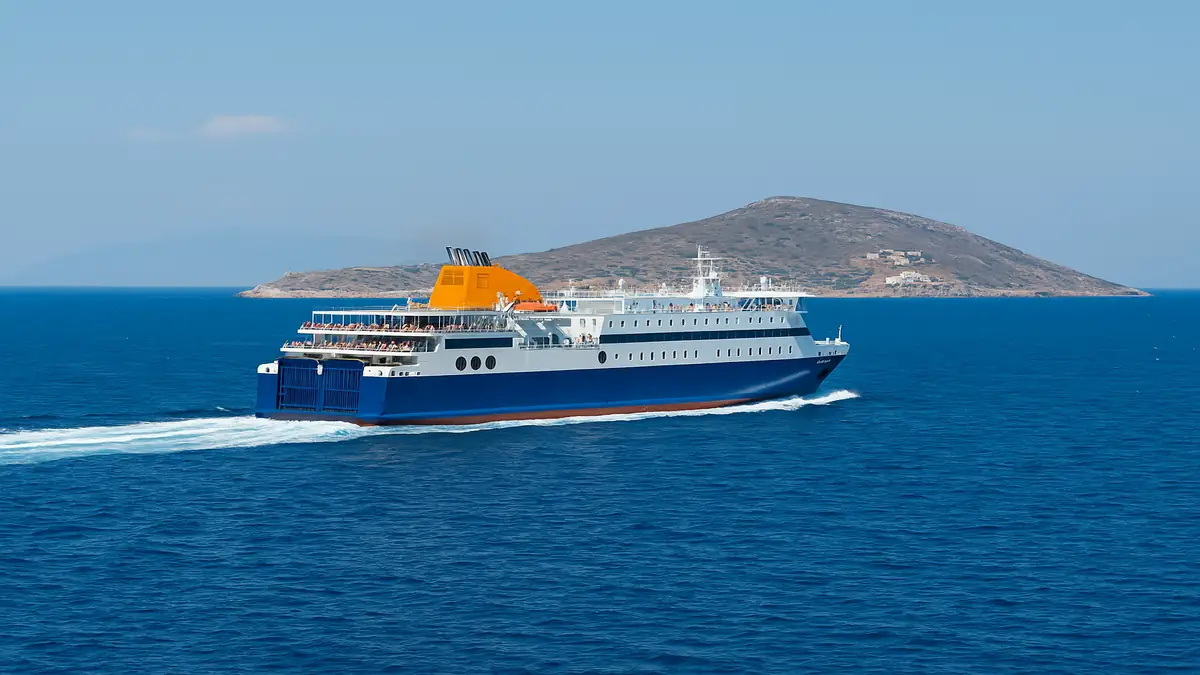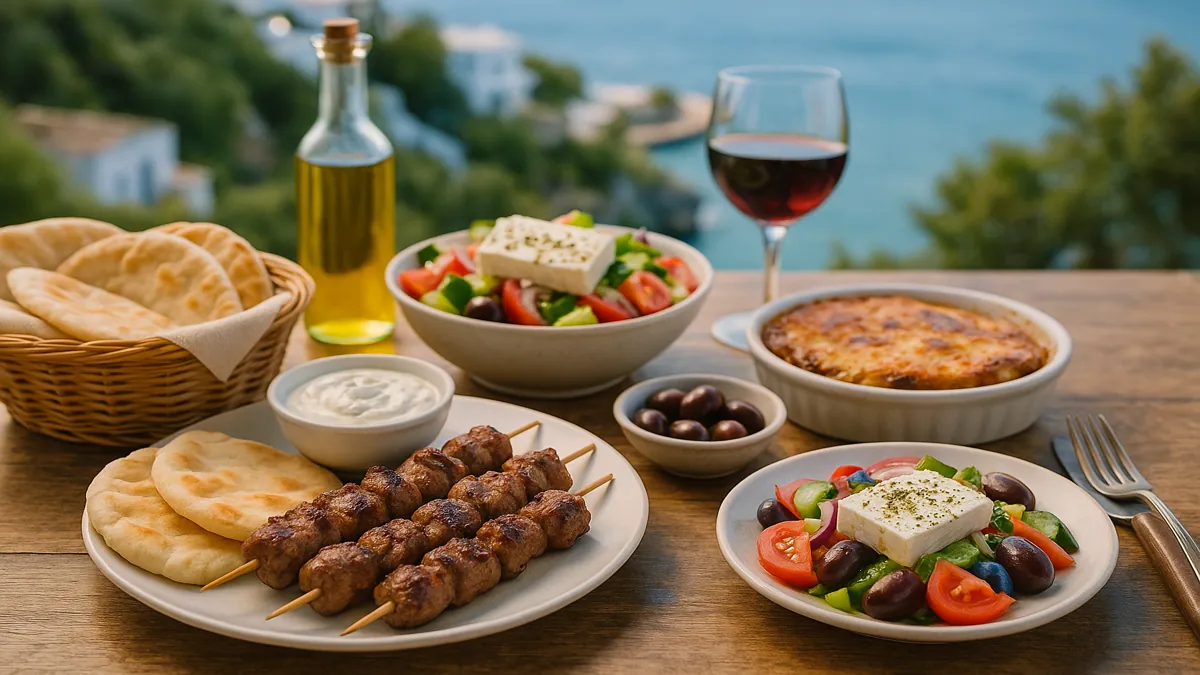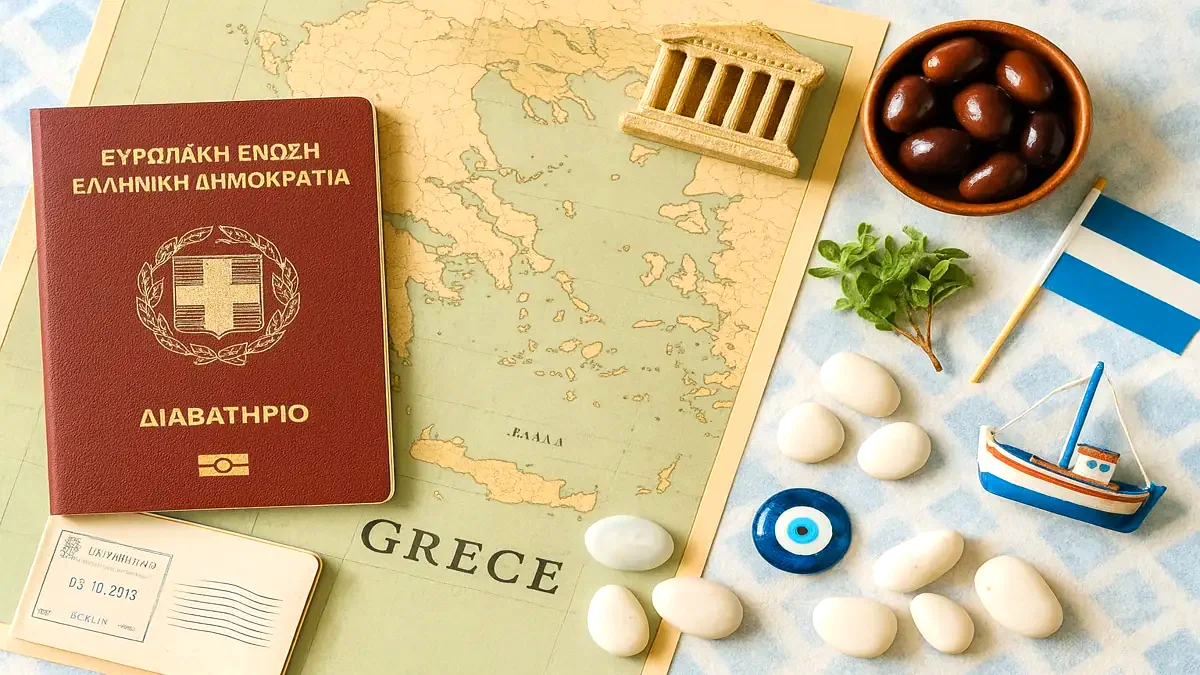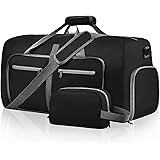Planning your first adventure to Greece in 2025? You’ve picked an absolutely legendary destination! This ultimate guide is packed with everything you need to know to make your trip unforgettable. From exploring ancient ruins that whisper tales of gods and heroes to island-hopping through the sparkling Aegean, we’ve got you covered.
Greece, the cradle of Western civilization, offers an unparalleled blend of ancient history, vibrant modern culture, breathtaking landscapes, and a warmth of welcome that’s truly unmatched. It’s a country that captivates every traveler, whether you’re wandering through the Acropolis, relaxing on a sun-drenched beach, or simply savoring delicious Mediterranean flavors.
Get ready to discover why Greece is consistently one of Europe’s most beloved travel destinations. Let’s dive into the essential tips that will help you plan, budget, and experience the very best of this amazing country.
Table of Contents
- 1. Why Visit Greece in 2025?
- 2. Best Time to Visit Greece
- 3. Top Destinations in Greece for First-Timers
- 4. Planning Your Greece Trip: A Step-by-Step Guide
- 5. Accommodation in Greece: Where to Stay
- 6. Getting Around Greece: Transportation Guide
- 7. How Much Does a Trip to Greece Cost?
- 8. Must-Try Foods and Cultural Delights
- 9. Staying Safe in Greece
- 10. Solo Travel in Greece
- 11. Traveling Greece with Family or as a Senior
- 12. Digital Nomads in Greece
- 13. Essential Packing List in our Greece Travel Guide
- 14. FAQs for First-Timers
- 15. What’s Next? More Guides to Explore
1. Why Visit Greece in 2025?
Greece is a land of captivating beauty and endless charm. In 2025, it continues to be a top choice for travelers seeking authentic experiences, stunning scenery, and a deep dive into history. Its unique blend of ancient heritage and modern vibrancy makes it truly special.
The Allure of the Hellenic Republic
Imagine exploring ancient temples that have stood for millennia, strolling through picturesque white-washed villages, or swimming in the crystal-clear waters of the Aegean Sea. Greece offers all this and more. The country boasts a welcoming atmosphere, delicious Mediterranean cuisine, and a rich cultural heritage that will leave you enchanted.
From the bustling streets of Athens to the tranquil beauty of its countless islands, Greece promises a journey filled with unforgettable moments. It’s a place where every sunset feels like a masterpiece, and every meal is a celebration of fresh, local flavors.
ETIAS Update for 2025
Good news for travelers! The European Travel Information and Authorization System (ETIAS) is still not required for U.S. and other visa-exempt travelers visiting the Schengen Area in 2025. Its implementation has been postponed to mid-2026. This means your entry to Greece will be as straightforward as it has been in previous years.
Looking for the best hotel or flight deals?
Plan your trip with ease using the Expedia search tool below. From charming boutique hotels to luxury resorts, this widget helps you compare top options in seconds — flights included!
2. Best Time to Visit Greece
Choosing the right time to visit Greece can significantly enhance your experience. The country enjoys a Mediterranean climate, but each period offers unique charms and considerations.
Spring (April-May): Blooming Beauty & Mild Weather
- Weather: Mild and pleasant, with temperatures ranging from 15-25°C (59-77°F). Expect plenty of sunshine and minimal rain.
- Crowds: Fewer crowds than summer, especially in April.
- Pros: Landscapes are green and vibrant, wildflowers are in bloom, and ancient sites are less busy. Perfect for sightseeing and hiking. Easter celebrations are significant.
- Cons: Sea might still be a bit cool for swimming, especially in early spring.
Summer (June-August): Sun, Sea & Lively Atmosphere
- Weather: Warmest and sunniest months, with temperatures averaging 25-35°C (77-95°F), often higher. Long daylight hours.
- Crowds: Peak tourist season, meaning larger crowds at popular sites and islands, and higher prices for accommodation and flights.
- Pros: Best weather for beach activities, swimming, and island hopping. Vibrant nightlife and festivals.
- Cons: Can be very hot, especially in July and August, which can make extensive sightseeing uncomfortable. Booking well in advance is essential.
Autumn (September-October): Golden Hues & Pleasant Warmth
- Weather: Mild and pleasant, with temperatures from 20-30°C (68-86°F) in early autumn, cooling down by October. Sea temperatures are still warm from summer.
- Crowds: Crowds begin to thin out, especially after mid-September. Prices become more reasonable.
- Pros: Ideal for swimming, sightseeing, and enjoying the islands without the intense summer heat. Beautiful light for photography.
- Cons: Days get shorter, and some island services might start to wind down by late October.
Winter (November-March): Quiet Charm & Cultural Focus
- Weather: Cooler, with temperatures from 10-15°C (50-59°F) in Athens, colder in the north. Occasional rain.
- Crowds: Fewest tourists (excluding Christmas and New Year). Lower prices for flights and accommodation.
- Pros: Excellent for exploring ancient sites without crowds. Ideal for city breaks and cultural immersion in Athens or Thessaloniki. Skiing is possible in mountainous regions.
- Cons: Many island resorts and services will be closed. Sea is too cold for swimming. Shorter daylight hours.
Recommendation for First-Timers: For a balanced experience with great weather and manageable crowds, consider late spring (May) or early autumn (September-early October). These shoulder seasons offer the best of Greece without the intense summer heat or winter quiet.
Make Your Travel Moments Go Viral — Instantly
Your next viral Reel and Tiktok is just a Flipstik away. Film hands-free on buses, beaches, or balconies—anywhere your phone can stick.
🎯 Click here and gear up like a creator!3. Top Destinations in Greece for First-Timers
Greece is brimming with incredible places to explore. For your first trip, focus on these iconic destinations that offer a true taste of the country’s diverse appeal.
Athens: The Historic Capital
Athens is an absolute must-visit. It’s a city steeped in history, mythology, and vibrant modern life. Explore iconic sites like the Acropolis (Parthenon, Erechtheion), the Ancient Agora, and the Acropolis Museum. Dive into the lively Plaka and Monastiraki neighborhoods for shopping and dining.
The city’s energy is infectious, blending ancient wonders with contemporary street art and bustling markets. Athens is highly walkable, and its metro system is efficient, making it easy to explore its diverse areas.
Santorini: Iconic Sunsets & Caldera Views
The quintessential Greek island, famous for its white-washed villages perched on cliffs overlooking the Aegean caldera. Oia and Fira offer breathtaking sunsets, luxurious stays, and stunning photo opportunities.
Santorini is perfect for romantic getaways, but be prepared for crowds, especially during peak season. Enjoy boat tours, explore volcanic beaches, and savor fresh seafood.
Mykonos: Cosmopolitan & Lively
Known for its vibrant nightlife, beautiful beaches, and chic atmosphere. Mykonos Town (Chora) with its winding alleys and windmills is charming. Paradise and Super Paradise beaches are famous for their parties.
Mykonos attracts a glamorous crowd and is ideal for those seeking a lively, social island experience. It’s more expensive than many other islands, but offers high-end dining and entertainment.
Crete: Diverse Landscapes & Rich History
Greece’s largest island offers an incredible variety of experiences. From the ancient Minoan palace of Knossos to stunning beaches like Elafonisi and Balos, and dramatic gorges like Samaria, Crete has something for everyone.
It’s a fantastic destination for history buffs, nature lovers, and beachgoers alike. Renting a car is highly recommended to explore its vast and varied landscapes.
Rhodes: Medieval Charm & Beach Bliss
Located in the Dodecanese island group, Rhodes boasts a stunning medieval Old Town (a UNESCO World Heritage site) surrounded by impressive walls. Beyond history, you’ll find beautiful beaches and lively resorts.
Rhodes offers a perfect blend of historical exploration and relaxing beach holidays. The Palace of the Grand Master of the Knights is a highlight.
Corfu: Venetian Elegance & Lush Greenery
In the Ionian Sea, Corfu stands out with its Venetian architecture, lush green landscapes, and beautiful beaches. Corfu Town, another UNESCO site, is incredibly charming with its narrow alleys and fortresses.
It’s a great choice for those seeking a blend of culture, history, and natural beauty, with a distinct Italian influence.
Delphi: Ancient Oracle & Mountain Views
Located on the mainland, Delphi was once considered the center of the world and home to the most important oracle in the ancient Greek world. The archaeological site, set against a dramatic mountain backdrop, is awe-inspiring.
A day trip from Athens or a stop on a mainland tour, Delphi offers a profound historical experience and stunning views.
4. Planning Your Greece Trip: A Step-by-Step Guide
Planning your first trip to Greece can feel overwhelming, but breaking it down into manageable steps makes it a breeze. Follow this guide to stay organized and stress-free.
Setting Your Budget & Travel Style
Before anything else, decide on your budget. Greece can be explored on a shoestring or with luxurious flair. Your budget will influence your choices for accommodation, transport, and activities. Consider if you prefer a fast-paced island-hopping adventure or a more relaxed, immersive experience.
Crafting Your Itinerary
Don’t try to see everything in one go. Greece, though seemingly small, is packed with attractions and islands. For a first trip, focus on 2-3 regions (e.g., Athens + 1-2 island groups). Allow at least 2-3 full days per major city or island. Prioritize what truly interests you.
Booking Flights & Accommodation
Book your international flights 3-6 months in advance for the best prices, especially if traveling during peak season (June-August). Accommodation should be secured around the same time, particularly in popular areas like Santorini and Mykonos. Consider flexible cancellation policies.
Understanding Visa & Entry Requirements
For most nationalities (e.g., US, Canadian, Australian, EU citizens), a visa is not required for tourist stays up to 90 days. As mentioned, ETIAS is not required for 2025. Ensure your passport is valid for at least six months beyond your intended departure date.
Securing Travel Insurance
Never travel without comprehensive travel insurance. It protects you from unexpected events like trip cancellations, medical emergencies, lost luggage, and more. It’s a small investment for peace of mind.
5. Accommodation in Greece: Where to Stay
Greece offers a vast array of accommodation options to suit every budget and travel style. Whether you prefer a cozy hostel, a charming guesthouse, or a luxurious resort, you’ll find the perfect place to rest after a day of exploration.

Hotels: From Boutique to Grand
You’ll find everything from chic boutique hotels in city centers and on islands to grand historic hotels. Hotels offer convenience, amenities, and often excellent service. Prices vary widely based on location, star rating, and season. On islands like Santorini, unique cave hotels offer a memorable experience.
Hostels: Social & Budget-Friendly
Greece has a thriving hostel scene, particularly in cities like Athens and popular islands. They are ideal for solo travelers and those on a budget, offering dormitory beds and often private rooms. Hostels are great places to meet other travelers and often organize social events.
Guesthouses & B&Bs: Authentic Greek Welcome
For a truly authentic Greek experience, stay in a guesthouse or a traditional Bed & Breakfast (often called “domatia” on the islands ). These often family-run establishments offer a warm welcome, personalized service, and a delicious homemade breakfast. They provide a more intimate glimpse into local life.
Self-Catering & Vacation Rentals
Platforms like Airbnb are popular for longer stays, families, or groups. Self-catering options provide more space, a kitchen for preparing meals (saving money), and a chance to live like a local. This is particularly appealing for those planning to explore rural areas or stay on an island for an extended period.
Unique Stays: Villas & Traditional Houses
For a memorable experience, consider staying in a traditional Cycladic house, a luxurious villa with a private pool, or a charming stone cottage. These unique accommodations offer a special touch to your Greek adventure, though they often come with a higher price tag.
6. Getting Around Greece: Transportation Guide
Navigating Greece is part of the adventure! The country offers various transportation options, each with its pros and cons. Your choice will depend on your itinerary, budget, and comfort level.

Flights: For Long Distances & Island Hopping
- Pros: Fastest way to travel between Athens and major islands (e.g., Santorini, Mykonos, Crete, Rhodes ) or northern Greece (Thessaloniki). Essential for maximizing time on shorter trips.
- Cons: Can be more expensive than ferries, especially if not booked in advance. Airport transfers add time and cost.
- Airlines: Aegean Airlines and Olympic Air are the main domestic carriers. Budget airlines like Ryanair also operate routes.
Ferries: The Heart of Island Hopping
- Pros: The quintessential Greek island-hopping experience. More affordable than flights, especially for shorter distances. Offers scenic views of the Aegean. Various types: high-speed catamarans (faster, more expensive) and conventional ferries (slower, cheaper, more stable).
- Cons: Can be affected by weather (strong winds can cause delays or cancellations). Slower than flights.
- Booking: Book well in advance during peak season, especially for popular routes. Use websites like Ferryhopper or direct ferry company sites.
Trains: Limited but Useful on Mainland
- Pros: Comfortable and relatively inexpensive for mainland travel. Connects Athens to cities like Thessaloniki, Patras, and Kalambaka (for Meteora).
- Cons: Limited network, not as extensive as in other European countries. Does not serve the islands.
- Booking: Book via Hellenic Train website or at stations.
Ready to book your train tickets hassle-free?
Search routes and compare prices on Trainline – your one-stop platform for rail travel across Europe.
Buses (KTEL ): Extensive Mainland Network
- Pros: The most extensive public transport network on the mainland, reaching towns and villages not served by rail. Generally affordable.
- Cons: Slower than trains for long distances. Can be less comfortable for very long journeys.
- Booking: Tickets usually bought at bus stations.
Driving in Greece: Flexibility on Mainland & Larger Islands
- Pros: Offers unparalleled flexibility to explore remote areas, scenic routes, and hidden gems on the mainland and larger islands (Crete, Rhodes).
- Cons: Driving can be challenging, especially in cities (Athens traffic is notorious). Roads can be narrow and winding. Parking can be difficult.
- Tips:
- International Driving Permit (IDP): Recommended if your license is not in English.
- Insurance: Get full coverage.
- Patience: Greek drivers can be assertive.
City Public Transport (Athens)
- Athens: Extensive metro, bus, tram, and trolleybus network. The metro is modern and efficient, connecting the airport, city center, and Piraeus port.
- Tickets: Purchase tickets at stations or kiosks. Multi-day passes are available.
Ready to book your train tickets hassle-free?
Search routes and compare prices on Trainline – your one-stop platform for rail travel across Europe.
7. How Much Does a Trip to Greece Cost?
Greece can be as expensive or as affordable as you make it. Popular islands like Santorini and Mykonos are known for being pricier, but venturing to less-known islands or the mainland can significantly reduce your daily expenses. Here’s a breakdown of typical costs for 2025:
Daily Cost Estimates (Per Person)
- Budget Traveler: €40-€80 / $45-90 USD per day
- Accommodation: Hostel dorms, budget guesthouses, camping.
- Food: Supermarket picnics, street food (souvlaki, gyros), cooking some meals.
- Transport: Public transport, walking, conventional ferries.
- Activities: Free museums, beaches, walking tours.
- Mid-Range Traveler: €80-€180 / $90-200 USD per day
- Accommodation: Mid-range hotels, B&Bs, private hostel rooms.
- Food: Mix of casual restaurants, cafes, some taverna dinners.
- Transport: Public transport, occasional taxis, some high-speed ferries, short domestic flights.
- Activities: Paid attractions, some tours.
- Luxury Traveler: €180-€400+ / $200-440+ USD per day
- Accommodation: Luxury hotels, boutique hotels, private villas.
- Food: Fine dining, frequent restaurant meals.
- Transport: Taxis, private transfers, domestic flights, private boat tours.
- Activities: Exclusive tours, private guides, high-end experiences.
Cost Breakdown (General Estimates)
- Accommodation:
- Hostel Dorm: €15-€35 per night
- Budget Hotel/Guesthouse: €50-€90 per night
- Mid-Range Hotel: €90-€200 per night
- Luxury Hotel: €200+ per night (Santorini/Mykonos can be €300-€1000+)
- Food:
- Supermarket/Picnic: €5-€10 per meal
- Street Food (Gyros/Souvlaki): €3-€6
- Casual Taverna Meal: €12-€25 per meal
- Mid-Range Restaurant: €25-€40 per meal
- Fine Dining: €50+ per meal
- Transportation (per day, average):
- Local Public Transport (cities): €5-€10
- Intercity Buses/Trains: Varies greatly (€10-€40+ per journey)
- Ferries (Athens to popular islands): €30-€80+ (one way, depending on speed/class)
- Domestic Flights: €50-€150+ (one way, depending on route/booking time)
- Activities & Sightseeing (per day, average):
- Budget (Free beaches, walking tours): €0-€15
- Mid-Range (Paid archaeological sites, museums): €15-€40
- High-End (Boat tours, specific excursions): €40+
Money-Saving Tips:
- Travel in Shoulder Season: Significant savings on flights and accommodation.
- Eat Street Food: Gyros, souvlaki, and spanakopita are delicious, filling, and cheap.
- Cook Your Own Meals: If staying in accommodation with kitchen facilities, buying groceries from supermarkets can significantly cut down food costs.
- Drink Tap Water: Generally safe to drink in most cities and towns on the mainland. On islands, check locally or opt for bottled water.
- Utilize Free Attractions: Many beaches are free. Explore charming villages on foot.
- Choose Less Popular Islands: Islands like Naxos, Paros, Milos, or Folegandros offer similar beauty to Santorini/Mykonos but at a fraction of the cost.
- Book Ferries in Advance: Especially during peak season. Consider conventional ferries for longer journeys to save money.
- Student/Senior Discounts: Always ask if you qualify for reduced entry fees at archaeological sites and museums.
8. Must-Try Foods and Cultural Delights
Greece’s culinary scene is a celebration of fresh, local ingredients, vibrant flavors, and ancient traditions. Prepare your taste buds for a feast, and immerse yourself in the country’s rich cultural heritage.

Iconic Greek Dishes
- Souvlaki & Gyros: The ultimate Greek street food. Skewered grilled meat (souvlaki ) or meat cooked on a vertical rotisserie (gyros), served in pita bread with tzatziki, tomatoes, and onions.
- Moussaka: A rich, baked dish with layers of seasoned ground meat, eggplant, and a creamy béchamel sauce.
- Greek Salad (Horiatiki Salata): Fresh tomatoes, cucumbers, onions, bell peppers, Kalamata olives, and a generous slab of feta cheese, drizzled with olive oil.
- Tzatziki: A refreshing dip made from Greek yogurt, cucumber, garlic, olive oil, and dill. Perfect with pita bread.
- Spanakopita: A savory pastry filled with spinach and feta cheese, wrapped in crispy phyllo dough.
- Fresh Seafood: Especially on the islands, enjoy grilled octopus, fresh fish, and calamari.
- Feta Cheese: A staple of Greek cuisine, found in salads, pastries, and as a standalone appetizer.
- Ouzo: A traditional anise-flavored aperitif, often served with mezedes (small plates).
- Greek Coffee: Strong and unfiltered, often served with a glass of water.
The Taverna Experience: More Than Just a Meal
The taverna is the heart of Greek dining. It’s a place for long, leisurely meals, shared plates, and lively conversation. Don’t be afraid to order a variety of mezedes to share. The atmosphere is usually relaxed and family-friendly.
Traditional Music & Dance
Seek out a live bouzouki music in a taverna, or if you’re lucky, witness traditional Greek dancing. The sirtaki (often associated with Zorba the Greek) is just one of many vibrant folk dances.
Cultural Etiquette & Local Customs
- Hospitality (Filoxenia): Greeks are renowned for their warmth and hospitality. You might be offered a complimentary dessert or drink at the end of a meal.
- Greetings: A simple “Yiasas” (hello, formal/plural) or “Yiasou” (hello, informal/singular) is appreciated.
- Punctuality: While generally relaxed, try to be on time for appointments or reservations.
- Dress Code: When visiting churches or monasteries, dress modestly (shoulders and knees covered).
- Tipping: Tipping is not obligatory but appreciated for good service. Round up the bill or leave 5-10% in restaurants.
9. Staying Safe in Greece
Greece is generally a safe country for tourists, but like any popular destination, it’s essential to be aware of your surroundings and take precautions.
General Safety Tips
- Be Aware of Your Surroundings: Especially in crowded areas like train stations, popular attractions (e.g., Acropolis, Plaka), and public transport.
- Protect Your Valuables: Use a cross-body bag or money belt. Avoid flashing expensive jewelry or electronics.
- Walk with Confidence: Look like you know where you’re going, even if you don’t.
- Avoid Isolated Areas at Night: Stick to well-lit, populated streets.
- Trust Your Gut: If a situation feels off, remove yourself from it.
Dealing with Pickpockets & Scams
Pickpocketing is the most common crime affecting tourists, particularly in busy areas of Athens (e.g., Syntagma Square, Monastiraki, metro). Risks include bag snatching and petty theft. Here’s how to minimize your risk:
- Keep Wallets in Front Pockets: Or use a money belt hidden under your clothes.
- Secure Bags: Keep zippers closed and bags in front of you, especially on crowded buses or trains.
- Be Wary of Distractions: Pickpockets often create diversions (e.g., asking for directions, dropping something) to distract you.
- Don’t Carry All Your Cash: Only carry what you need for the day. Leave extra cash and important documents in a hotel safe.
- Credit Card Fraud/ATM Scams: These are becoming more common. Check ATMs before use and don’t use machines that look unusual.
Emergency Numbers
- The universal emergency number in Greece (and throughout the EU) is 112 for police, ambulance, and fire services.
10. Solo Travel in Greece
Greece is an incredibly rewarding destination for solo travelers, offering freedom, flexibility, and endless opportunities for self-discovery. Many Greek cities and islands are safe and easy to navigate alone, with a welcoming culture.
- Safety First:
- Research Accommodation: Choose well-reviewed hostels or hotels in safe neighborhoods. Many hostels offer female-only dorms.
- Be Aware of Your Surroundings: Especially at night or in crowded areas. Trust your instincts.
- Share Your Itinerary: Let a friend or family member know your plans.
- Emergency Contacts: Keep local emergency numbers (112) and your embassy’s contact info handy.
- Meeting People:
- Hostels: Stay in hostels with good common areas and social events.
- Walking Tours: A great way to see a city and meet fellow travelers. Many cities offer free walking tours.
- Tavernas: Engage in conversation at a local taverna. Greeks are known for their friendliness.
- Activities: Join group tours (e.g., island-hopping cruises, cooking classes) to meet like-minded individuals.
- Embrace Solitude: Enjoy the freedom of setting your own pace, lingering at an ancient site, or simply people-watching with a Greek coffee.
- Budgeting for One: Be mindful of single supplements for tours or accommodation. Hostels and self-catering apartments can be more budget-friendly.
11. Traveling Greece with Family or as a Senior
Greece caters wonderfully to all ages, but specific considerations can enhance trips for families and senior travelers.
Traveling with Family
- Kid-Friendly Attractions: Greece offers numerous beaches, ancient sites (many with engaging stories for kids), and interactive museums. Many coastal towns and islands are perfect for family-friendly holidays.
- Accommodation: Apartments or hotels with family rooms/suites often provide more space and convenience. Consider places with kitchenettes to prepare some meals. Resorts often have kids’ clubs and pools.
- Transportation: Ferries are generally fun for kids. If driving, ensure car seats are appropriate.
- Pacing: Don’t overschedule. Allow for downtime, beach play, and spontaneous exploration. Remember that meal times can be later than in some countries.
- Packing: Bring familiar snacks, comfort items, and any necessary medications. Sun protection is crucial.
Traveling as a Senior
- Accessibility: Research accessibility for attractions and public transport, especially if mobility is a concern. Many ancient sites involve uneven terrain and stairs. Some modern museums and hotels are more accessible.
- Pacing: Opt for a slower pace. Choose fewer destinations and spend more time in each to avoid rushing. Consider guided tours that handle logistics.
- Discounts: Many museums, attractions, and public transport systems offer senior discounts. Always ask!
- Medical Considerations: Carry all necessary medications in their original packaging. Consider travel insurance that covers pre-existing conditions.
- Comfort: Prioritize comfortable shoes and easy-to-access accommodation. Consider coach tours or cruises if you prefer less movement and organized travel.
12. Digital Nomads in Greece
Greece is emerging as an attractive destination for digital nomads, offering a unique blend of rich culture, beautiful scenery, and a growing number of cities with vibrant remote work communities. It even has its own Digital Nomad Visa.
- Visa Considerations: Greece offers a specific Digital Nomad Visa, allowing non-EU citizens to reside and work remotely in Greece for up to 12 months, with the possibility of renewal. This is a significant advantage. Always check the official Greek Ministry of Migration and Asylum website for the latest requirements.
- Best Cities for Nomads:
- Athens: Capital city energy, diverse opportunities, good transport, numerous co-working spaces, and a large expat community. More affordable than Western European capitals.
- Thessaloniki: Vibrant and more affordable than Athens, with a growing tech scene and a strong sense of community.
- Crete (Chania/Heraklion): Offers a great quality of life, beautiful nature, and a lower cost of living, especially outside the main tourist hubs.
- Smaller Islands: Some islands are developing nomad-friendly infrastructure, but connectivity and services can be more limited.
- Connectivity: Greece boasts good internet infrastructure, especially in urban areas and popular islands. eSIMs are a convenient option for staying connected.
- Cost of Living: Varies significantly. Athens is more affordable than many Western European capitals, and smaller cities/towns offer even better value.
- Co-working Spaces: Abundant in major cities, offering dedicated workspaces and networking opportunities.
Looking for a smarter way to manage your travel money? Wise offers real exchange rates with no hidden fees, making it the perfect companion for international trips.
13. Essential Packing List in our Greece Travel Guide
Packing for Greece means preparing for sunshine, ancient sites, and beautiful beaches! Layers are your best friend, especially during shoulder seasons. Here’s a comprehensive list to ensure you’re ready for anything the Hellenic Republic throws at you.
Clothing
- Lightweight & Breathable Fabrics: Cotton, linen, and rayon are ideal for warm weather.
- Swimwear: Essential for beach days and hotel pools.
- Comfortable Walking Shoes/Sandals: You’ll be doing a lot of walking on uneven terrain (ancient sites, cobblestones).
- Dressier Outfit (Optional): For nice dinners or evenings out.
- Light Jacket/Cardigan: For cooler evenings, especially in spring/autumn or on islands where it can get breezy.
- Sun Hat & Sunglasses: Crucial for sun protection.
- Modest Clothing: If you plan to visit monasteries or churches, bring something to cover your shoulders and knees.
Essentials & Accessories
- Universal Travel Adapter: Greece uses Type C and F plugs (two round pins).
- Portable Power Bank: For charging devices on the go.
- Reusable Water Bottle: Stay hydrated and reduce plastic waste. Tap water is generally safe on the mainland.
- Daypack: For daily excursions, carrying water, snacks, and essentials.
- First-Aid Kit: For minor cuts, headaches, and any personal medications.
- Sunscreen: High SPF is a must.
- Copies of Important Documents: Keep digital and physical copies of your passport, travel insurance, and flight/accommodation bookings.
- Beach Towel: If your accommodation doesn’t provide one.
As an Amazon Associate, we earn from qualifying purchases.
14. FAQs for First-Timers
Here are some frequently asked questions to help ease any remaining concerns about your first trip to Greece.
Is Greece expensive to visit?
Greece can be expensive, especially popular islands like Santorini and Mykonos. However, it’s possible to travel on a budget by staying in hostels, eating street food, utilizing free attractions, and using public transport. Venturing to less-known islands or the mainland often offers better value.
Do I need a visa for Greece in 2025?
For most nationalities (e.g., US, Canadian, Australian, EU citizens), a visa is not required for tourist stays up to 90 days. The ETIAS system is not expected to be in effect for 2025. Always check official government websites for the latest requirements based on your nationality.
What’s the best way to get around Greece?
For island hopping, ferries are essential, with flights being faster for longer distances. On the mainland, buses offer an extensive network, and trains connect major cities. Renting a car provides flexibility for exploring remote areas.
What should I pack for Greece?
Lightweight, breathable clothing, swimwear, comfortable walking shoes, and sun protection (hat, sunglasses, high SPF sunscreen) are essential. A light jacket for evenings and modest clothing for religious sites are also recommended.
Is it safe to travel solo in Greece?
Yes, Greece is generally very safe for solo travelers. Use common sense precautions, especially at night in urban areas, and be aware of your surroundings. Hostels are great for meeting other travelers.
Can I use my credit card everywhere?
Credit and debit cards are widely accepted, especially Visa and Mastercard, in most tourist areas and larger towns. However, it’s wise to carry some cash for smaller purchases, local markets, or in more remote areas and smaller islands.
What’s the currency in Greece?
The currency in Greece is the Euro (€).
What’s the food like in Greece?
Greek food is fresh, flavorful, and delicious! Expect dishes like souvlaki, gyros, moussaka, Greek salad, and fresh seafood. The taverna experience is central to Greek dining, offering shared plates and a relaxed atmosphere.
15. What’s Next? More Guides to Explore
Your Greek adventure awaits! We hope this comprehensive guide has equipped you with all the essential information to plan an unforgettable trip to the Hellenic Republic. From the ancient wonders of Athens to the sun-drenched beaches of its islands, Greece promises a journey filled with magic and memories.
Happy travels, and enjoy your unforgettable journey through Greece!
Related Articles to Inspire Your Next Adventure:
🇪🇺 Western Europe
🇪🇺 Southern Europe
🇪🇺 Northern Europe
🇪🇺 Central Europe
🇪🇺 Eastern Europe & Baltics
🌍 Continental Overview
References:
European Union. (2025, April 14). Revised timeline for the EES and ETIAS. Retrieved from Official EU Site





